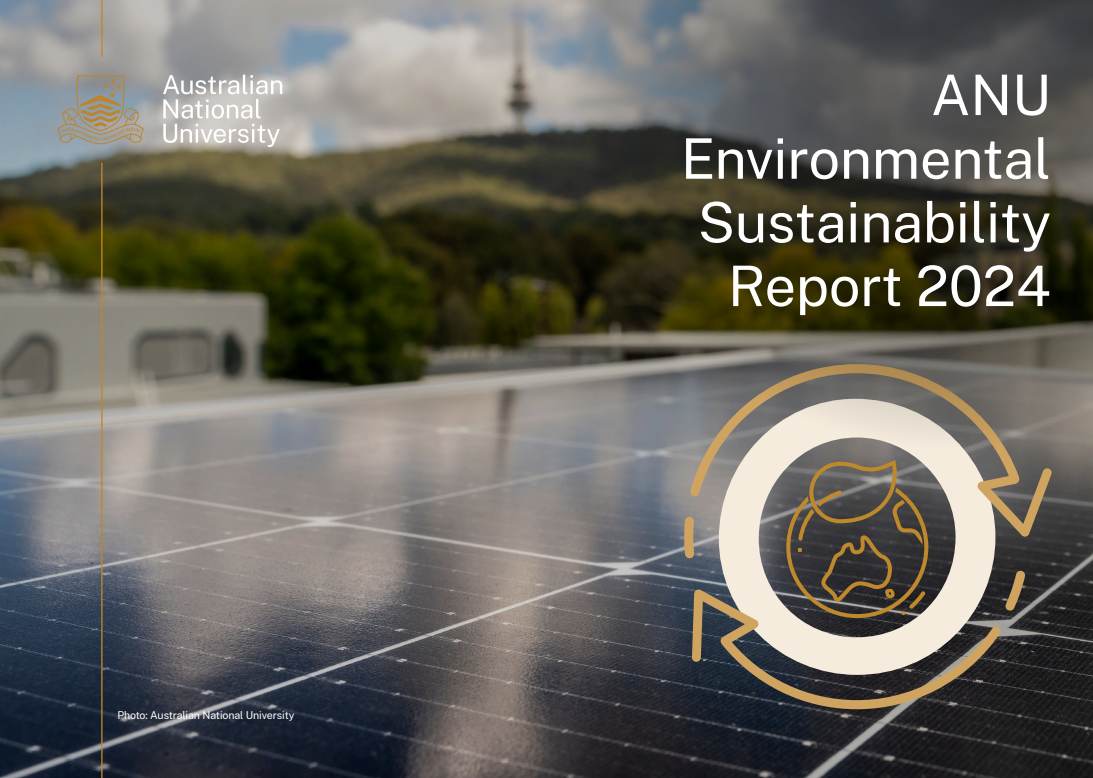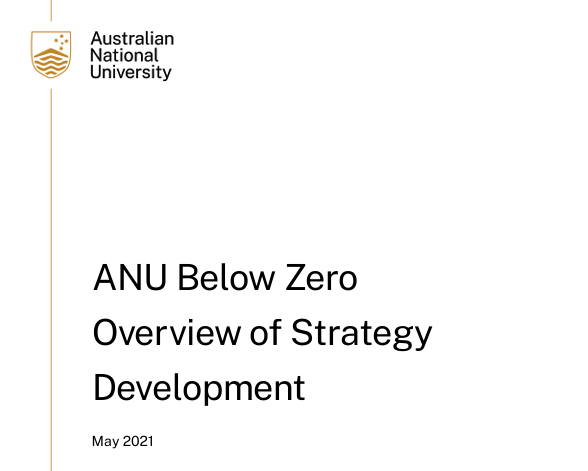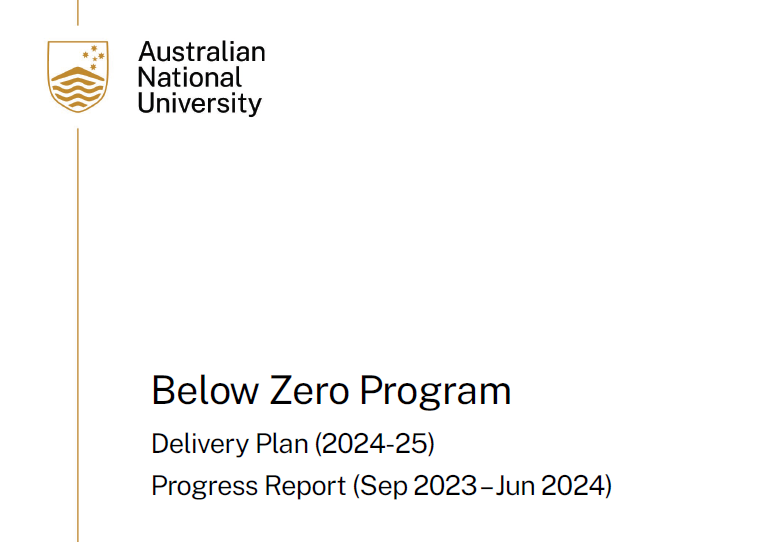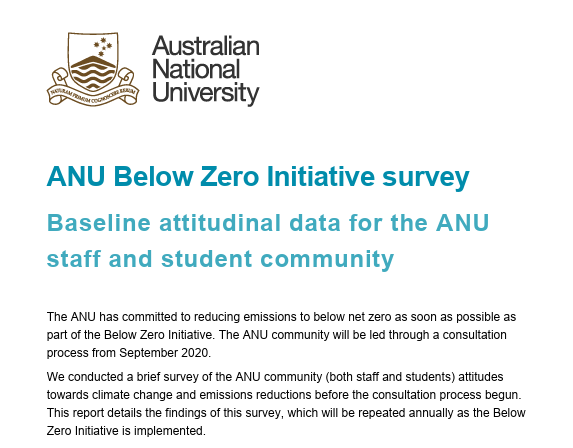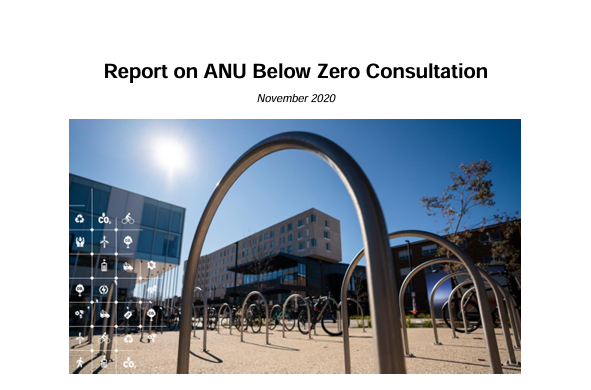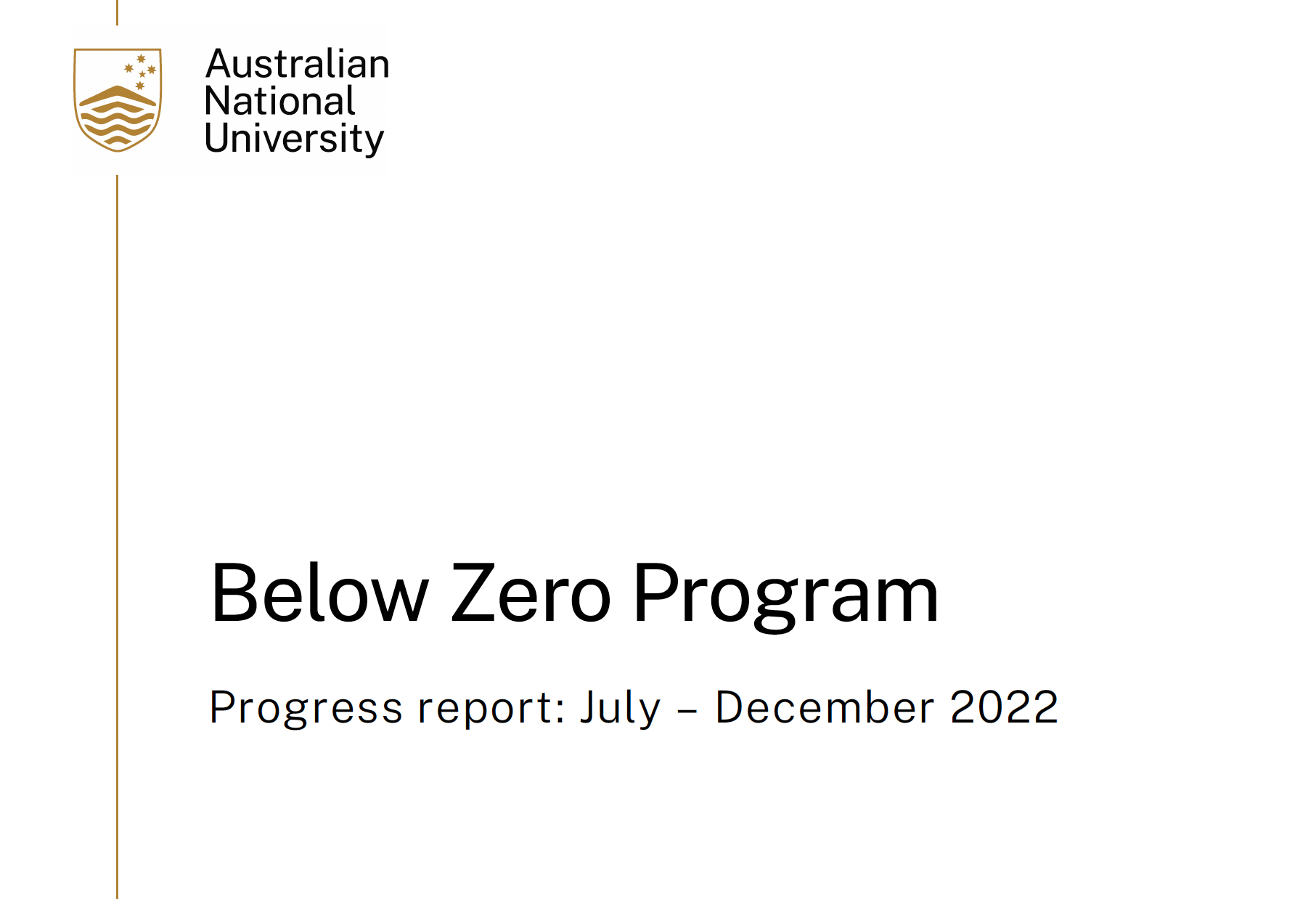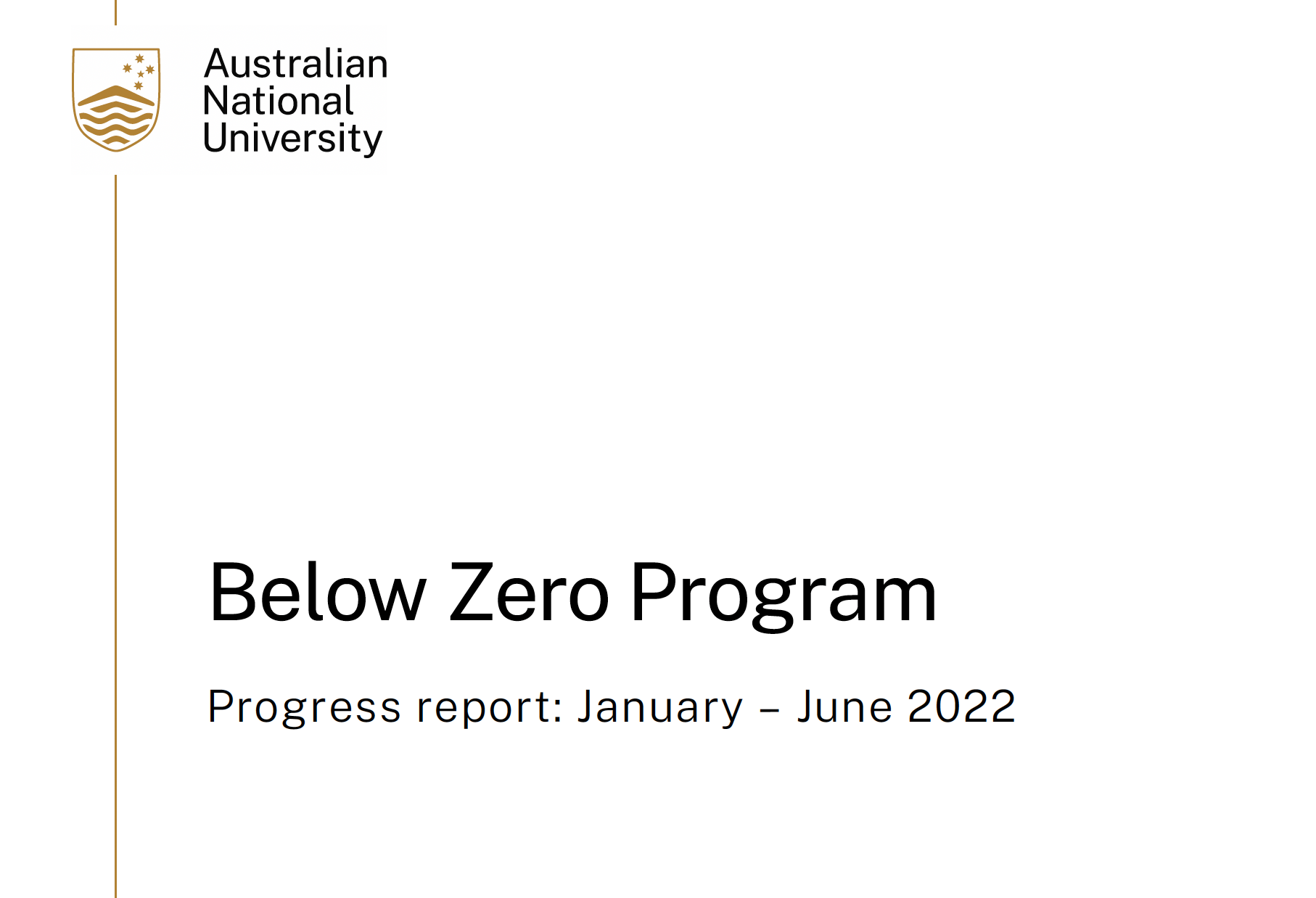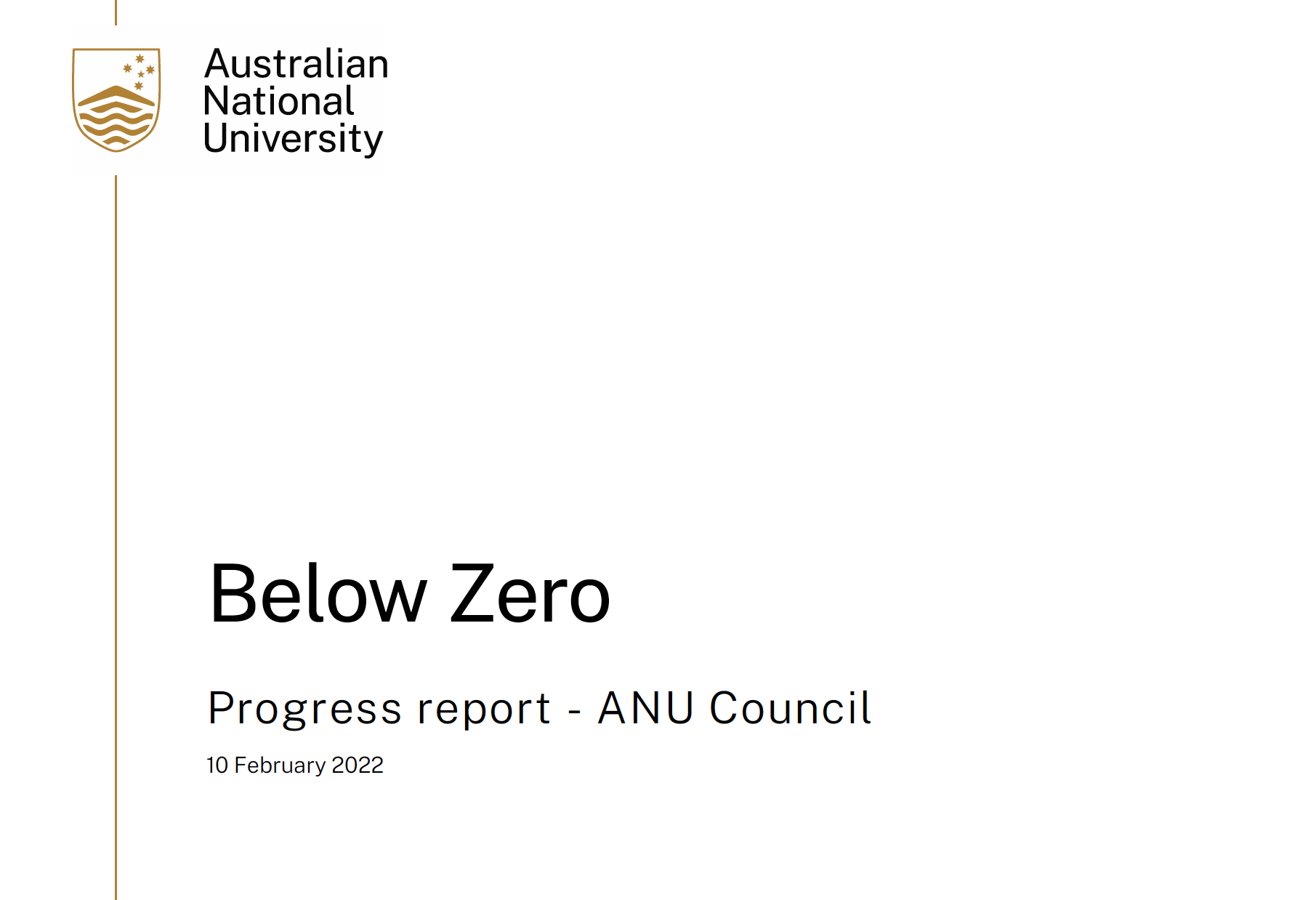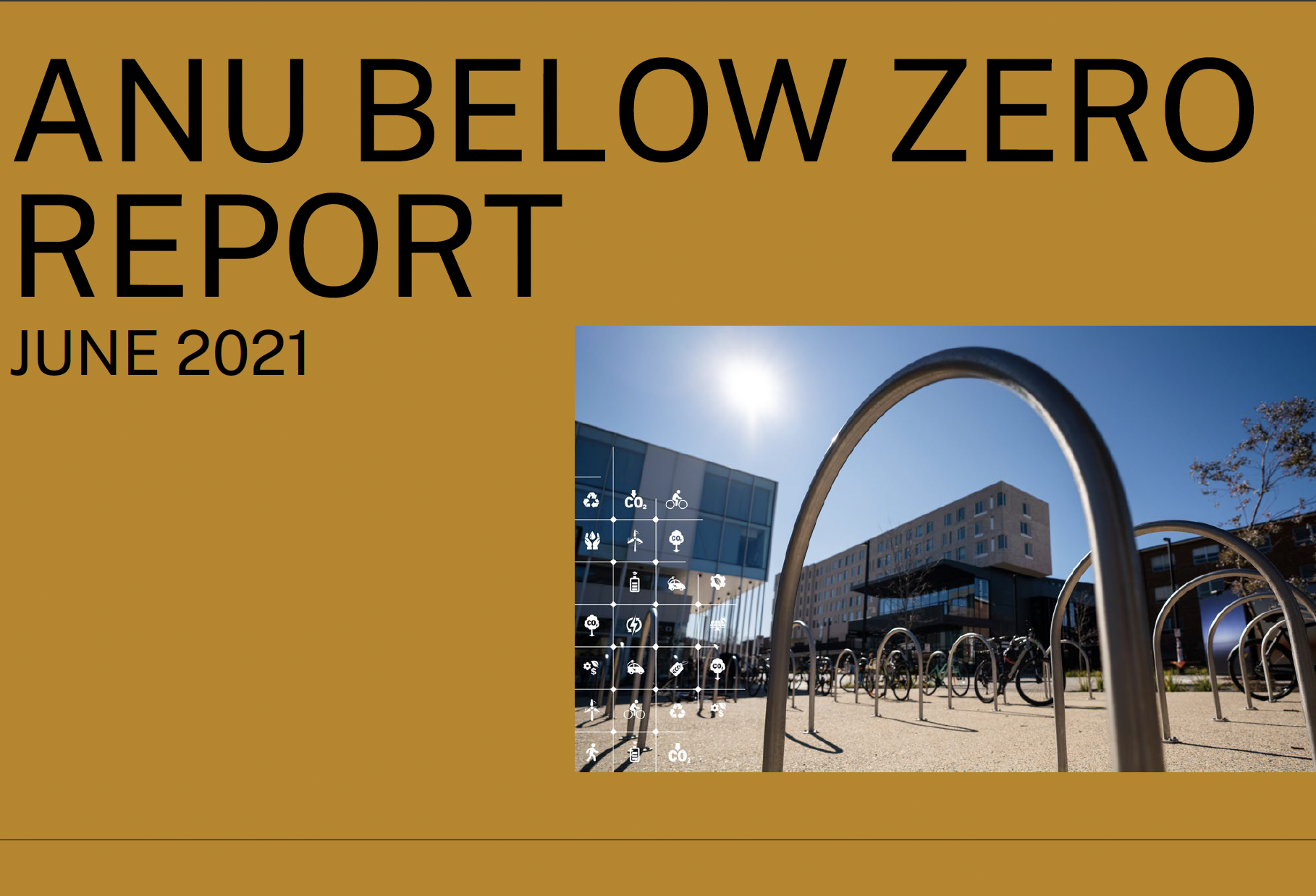This page is a repository of reports and publications from activities across the ANU Environmental Sustainability program and publications from other relevant programs associated with sustainability at ANU. It includes:
- annual reports,
- progress reports,
- operational reports,
- student research and internship project reports and
- other publications.
The primary ANU Environmental Sustainability program is named ANU Green. It is directed by the Dhaagun Environmental Management Plan (EMP), which provides an approach with supporting goals to improve environmental sustainability across its Acton campus and regional sites. Read more about our strategy.
In 2024, the EMP was updated to reflect organisational and regulatory changes. Climate risk was added as a seventh pillar of the EMP to ensure the University discloses and manages climate risks, adapts to future climate impacts and meets Commonwealth Climate Disclosure requirements.
The ANU Below Zero program, a distinct climate action program launched in 2021, merged with ANU Green in 2024. Below Zero now refers to the ANU climate action ambitions, which sit within the first pillar, greenhouse gas management. For previous years' work, see ANU Below Zero progress reports below.
Explore our Solutions pages for more information on our approach and ongoing projects within each pillar.
Environmental Management Plan
Environmental Sustainability Report
The Environmental Sustainability Report is an annual account of the University's achievements in its environmental sustainability programs.
Our first report highlights our efforts in 2023 to embed environmental programs across the campus and into our operations, cultivate a living lab environment by integrating these programs with research and teaching and foster relationships with our community and external partners.
Below Zero Progress Reports
ANU Below Zero Program was established to guide the University’s journey toward reducing and removing greenhouse gas emissions to below zero. The initiative set the University's long-term climate targets and outlined pathways to achieve them through emissions reduction, removal and engagement.
Prior to its integration with ANU Green in 2024, consolidating our climate action efforts within the ANU Campus Environment Division, Below Zero produced regular Progress Reports to ANU Council. These reports tracked progress against climate targets and identified key developments, challenges, and opportunities across the University.
This section includes Progress Reports which outline key trends and events over the Below Zero reporting period as well as historical documents from the development of the Program: Overview of Strategy Development, Report on Consultation and an Initiative Survey.
Student Projects
| Project name | Project description | Project status |
|---|---|---|
| Analysing Commuting Patterns - Path to Emission Reduction at ANU
| Chaitry Kariya's report explores the carbon emissions generated from commuting to and from the Australian National University campus by staff and students. The project offers a thorough examination of commuter behavior, assessing emissions by mode of transportation, and pinpoints potential to encourage active and sustainable commuting methods as part of the university's goal to reach net-zero emissions by 2040. Read the full report (PDF, 1,446 KB). | Complete |
| Sustainable Procurement Framework and Supplier Evaluation Criteria
| Medha Maruti Hegde's report proposes a framework that intends to enhance the procurement operations at ANU by integrating sustainability. It also proposes evaluation criteria to guide supplier selection, aiming to enhance cost reduction, supply chain resilience, and compliance with ethical standards. Read the full report (PDF, 1,796 KB). | Complete |
| Climate Adaptation at the Australian National University
| Zoe's report explores the University's opportunity to take a leadership position in climate risk assessment and adaptation planning in Australia's tertiary sector. Read (PDF, 678 KB) the full report. | Complete |
| Measurement, Reporting and Verification of Biodiversity Co-benefits for ANU-Connected Carbon Removal
| Akari's report outlines frameworks for assessing the biodiversity co-benefits of carbon removal projects for the ANU Below Zero Program. Read the full report (PDF, 1,106 KB). | Complete |
| Building Sustainable Heat Infrastructure - Mapping Funding Strategies for The Australian National University’s Electrified District Energy Hubs
| Fawwad's report establishes an evaluation framework for potential funding strategies for sustainable heat infrastructure at the University. Read the full report (PDF, 346 KB). | Complete |
| Sustainability Reporting In Universities
| Erin Upfold explores the Global Reporting Initiative and Sustainability Tracking, Assessment and Rating System as potential sustainability frameworks that may better place the University to measure and report on its environmental, social and governance impacts. Erin recommends the STARS framework is most suited to the University given its widespread use internationally and specific design for universities. Read the full report (PDF, 1,941 KB). | Complete |
| Carbon Emissions Events Visualiser
| Honours Student Isabella Federle developed an interactive visualiser for participants and organisers of OzCHI22. Read the full report (PDF, 2043 KB). | Complete |
| Web App to Choose a Greener Transportation Method in Business Trips
| Honours Student Zhiyuan Ning designed a mobile app that motivates ANU staff to choose a transportation method that reduces their carbon footprint on business trips. Read the full report (PDF, 73.2 KB). | Complete |
| Corporate Sustainability/ESG Frameworks
| Yuchen Liu developed proposed an ESG reporting method. Read the full report (PDF, 297 KB). | Complete |
| HR Levers for Travel Behaviour Change
| Nick Warren-Smith reviewed University policies and resources to identify areas where travel behaviour may be influenced without sacrificing opportunities for staff and the core missions of the University. Read the full report (PDF, 510 KB). | Complete |
| Carbon Credit Market Assessment
| Tom Adams investigated the viability of several short-term offsetting strategies for the University, using qualitative analysis to identify and contrast potential approaches to reaching net zero emissions. Read the full report (PDF, 684 KB) | Complete |
| Pathways towards ANU Below Zero: A review of behavioural change, waste management, and carbon sequestration
| A critical literature review was performed to evaluate behavioural change and waste management and carbon sequestration strategies in universities such as the University of Cambridge, and organisations of Blue Planet. This evaluation highlighted 11 principles contributing to universities’ success in behavioural change and waste management strategies to reduce carbon emissions which may be beneficial for consideration by ANU Below Zero. Four enabling environments were identified for effective carbon sequestration: long-term commitment, research funding, alignment with circular economy policies, and carbon accounting mechanisms. Read the full report (PDF, 833 KB). | Complete |
| Aggregated Energy Use at the ANU
| This report determines how energy use is aggregated from individuals, through subcommunities using the ANU Research School of Astronomy and Astrophysics (RSAA) as a case study to the whole of the Australian National University (ANU) campuses. This report is presented to the ANU Executive to inform short, medium and long term strategies that can be implemented to support behavioural change, reduce energy use and encourage long term campus sustainability. Read the full report (PDF, 813 KB). | Complete |
